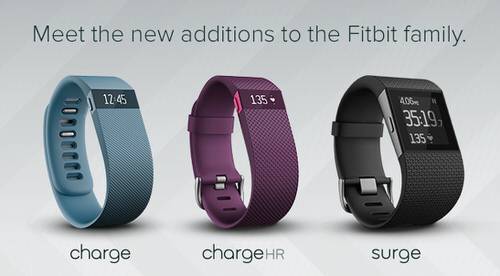Fitbit is charging ahead with a new line of fitness trackers. On Monday the company unveiled three new wearables that make it easy for people to track exercise, sleep, and heart rate from their wrist.

The company is already one of the most popular wearable makers, known for its slender and simple fitness trackers that provide wearers with comprehensive activity monitoring. Now Fitbit’s new line of devices expands its offerings with the Fitbit Charge, a reboot of the Fitbit Force; the Fitbit Charge HR with heart rate tracking; and the Fitbit Surge, which is practically a smart watch.
Fitbit Charge is similar to the failed Force, which was recalled from stores after consumers complained about skin irritation. Charge displays real-time activity statistics on the OLED display, including floors climbed, distance traveled, and calories burned, and the device tracks sleep patterns and features a vibrating alarm. Like other smart devices, Charge provides a caller ID and shows the wearer who is calling when their smartphone is nearby. Charge has up to a seven-day battery life and costs $130.
Fitbit Charge HR ups the offerings of Charge with a heart rate monitor that works throughout the day. It will show users their heart rate trends, like resting and workout heart rate alongside other activity reports, with just a five-day battery life. Charge HR is set to release in early 2015 for $150—at just $20 more than Charge, it might be worth the wait.
Much bigger than the other two devices, the Fitbit Surge packs more onto the wrist with eight sensors including 3-axis accelerometers, gyroscope, compass, and an ambient light sensor. Surge has a built-in GPS—which the Apple Watch and other smartwatches lack—along with other smartwatch features like caller ID, text alerts and music control. Like the Charge HR, Surge also provides all-day heart rate tracking but a stronger seven-day battery life. Surge will be released in early 2015 as well, and at $250, on the high-end of wearables.
Taking On Apple
With the fumbled launch of Apple HealthKit in iOS 8.0 last month, many people were looking forward to integrating their exercise apps and products like Fitbit, Jawbone and Runkeeper into one central location to track and monitor activity.
See also: Apple Yanks Fitbit—And Looks Like A Bully For Doing So
But Fitbit is getting spurned by Apple. The fitness wearable company hasn’t yet offered HealthKit integration, and Fitbit devices were pulled from Apple Stores, while its applications aren’t featured in the “Apps for Health,” section of the App Store.
Apple’s own smartwatch is set to debut in 2015 as well, but is geared more toward everyday wear than for people who want fitness wearables. (The lack of a built-in GPS is a no-go for active runners who might be in the wearable market, as Matt Asay wrote earlier this year.)
Fitbit still owns the activity tracker market, and its new suite of affordable fitness trackers may be more appealing to people who are looking exclusively for tools that can amplify exercise, rather than an all-in-one smartwatch that will cost hundreds more.
Images courtesy of Fitbit

















